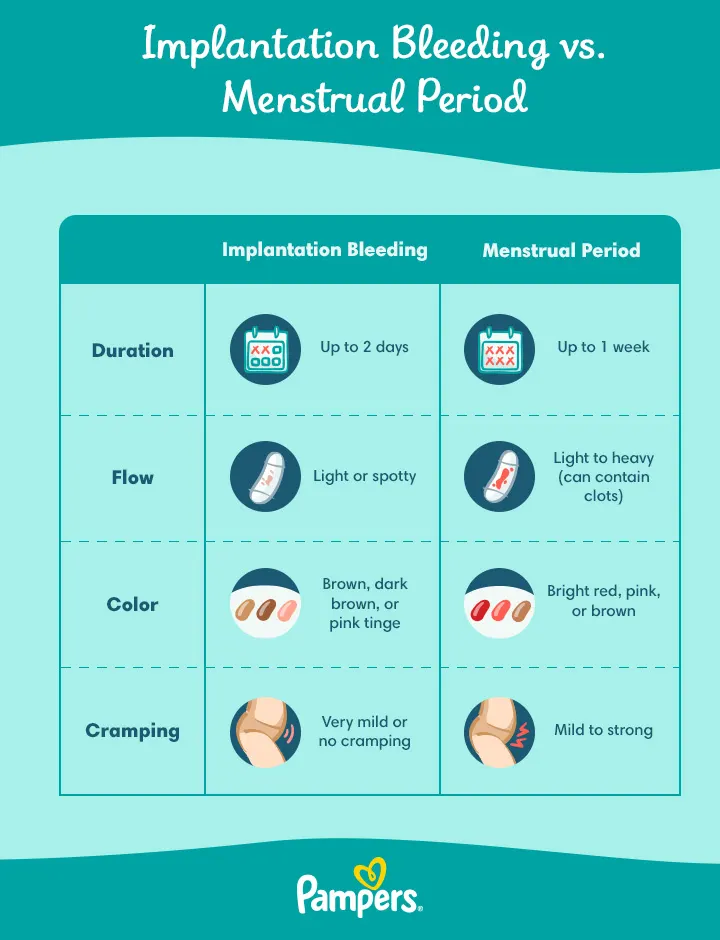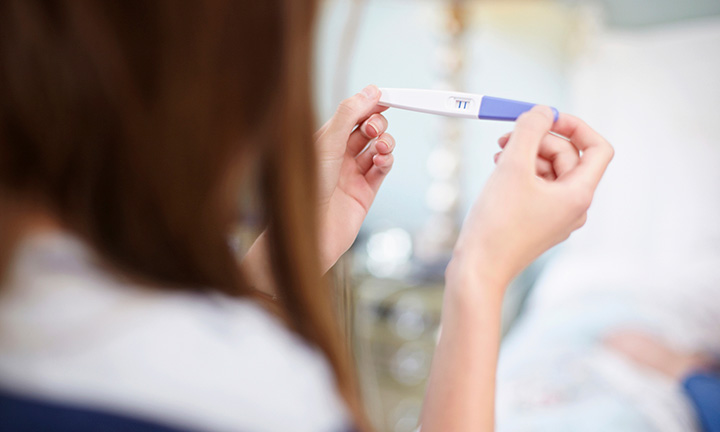
All About Implantation Bleeding
When a fertilised egg attaches to the wall of the uterus, some symptoms such as light spotting may occur. This is called implantation bleeding, and it can be one of the earliest clues that you may be pregnant.
Some pregnant people don’t experience this type of bleeding, and some simply don’t notice it. Read on to discover when implantation bleeding happens and what it looks like.
What Is Implantation Bleeding?
Implantation bleeding is harmless light spotting that can happen after a fertilised egg – by this time called an embryo – embeds itself in the lining of your uterus.
Although it might seem similar to a very light period, it has a very different cause: Implantation spotting is due to tiny blood vessels in your uterus bleeding as the embryo implants itself.
What Does Implantation Bleeding Look Like?
If you suspect you're pregnant or you’re trying to get pregnant, you may wonder how to recognise implantation bleeding and what are the symptoms. If you have implantation bleeding, the first thing you’ll notice is probably a few streaks or smears of blood on the toilet paper when you wipe, or maybe some spots on a sanitary pad or your underwear.
What Colour Is Implantation Bleeding
Implantation bleeding is typically pink or brown. It’s generally lighter than the bright red blood you may see during a menstrual period.
How Heavy Is Implantation Bleeding?
It’s common for implantation bleeding to be very light bleeding or spotting. It’s not heavy enough to soak through a pad or your underwear.
Implantation Bleeding Vs. Menstrual Period
So, what are the symptoms of implantation bleeding vs. a menstrual period? It’s possible to mistake the symptoms of implantation bleeding for a very light period at first, especially if it occurs about when you’d normally expect your period to arrive. Implantation bleeding can also sometimes be accompanied by mild cramping.
However, there are some clues to pay attention to. Although every woman’s period is different, implantation bleeding is usually very light, or even just a little spotting. So, it’s likely that there will be much less blood than you usually see during a regular period – especially if you usually have relatively heavy periods.
Keep in mind, though, that heavier bleeding may also occur in early pregnancy, and this is not always a problem either, so it’s always best to see a doctor if you think you may be pregnant and experience any kind of bleeding.
It’s also worth looking out for other early signs of pregnancy. Some of those signs might include more frequent trips to the loo, fatigue or morning sickness.
Not all pregnant people experience these symptoms straight away though, especially during the first few weeks of pregnancy, so if you haven’t yet noticed anything other than some very light bleeding or spotting – or even if there are no signs at all – it doesn’t necessarily mean you’re not pregnant.
Here are some ways to help you recognise implantation bleeding and tell the difference between your menstrual period and implantation bleeding:
When Does Implantation Bleeding Occur?
You may notice implantation bleeding anytime between 7 to 14 days after conception. So, if you have a regular cycle, there’s a chance it could happen more or less when you’d expect to have your next period (if you weren’t pregnant).
This is why some people mistake implantation bleeding for a very light period, especially if they weren’t expecting to get pregnant.
For someone with a regular, 28-day menstrual cycle, the timing of implantation bleeding could look something like this:
Keep in mind that it’s difficult to know exactly when you ovulate or conceive, especially if your cycle is irregular. When you last had sex is not a reliable indicator either, because sperm can live for up to seven days inside a woman’s reproductive tract. This means conception might not occur for several days after sex.
How Long Does Implantation Bleeding Last?
Implantation bleeding usually clears up in a few days at most, but even light bleeding or spotting that lasts for longer than this is not always a cause for concern.
This is because there are other causes of light bleeding in early pregnancy – including hormonal changes, a yeast infection or polyps – that are not necessarily harmful to your pregnancy. Some of these may last longer than implantation bleeding.
If you’re unsure whether you’re experiencing implantation bleeding or some other kind, get in touch with your doctor or midwife to arrange an examination. This is really the only way to find out whether the bleeding is harmless or potentially more serious.
Should You Take a Pregnancy Test During Implantation Bleeding?
You can take a home pregnancy test during implantation bleeding. Keep in mind that the pregnancy hormone human chorionic gonadotropin (or hCG) that pregnancy tests detect only starts being produced in your body the moment the fertilised egg is implanted in the uterus.
This is also the trigger for implantation bleeding, so when you notice any spotting it might still be very early in your pregnancy.
The earlier you take the test, the less hCG there is to detect, meaning that the test may not yet be accurate. Some tests are more sensitive than others, and some claim to detect hCG as early as eight days after conception.
If you have the patience to wait, however, you’ll get a more accurate test result if you leave it until at least the day your period would normally be due. If you’re not sure when that is, then for more accurate results try at least 21 days after you last had unprotected sex.
If you get a positive test result, get in touch with your general practitioner (GP) or a midwife to confirm your pregnancy and start your antenatal care.
While you’re waiting for your first antenatal appointment, you can use our handy due date calculator to get an estimate of when your little one might arrive.
When to Contact Your Doctor
Implantation bleeding is usually nothing to worry about, but it’s best to talk to your doctor or midwife about any bleeding you experience during pregnancy.
Keep in mind that there are other causes of bleeding in early pregnancy, and many of these are not a cause for concern, although they do need to be checked out. For example, pregnancy hormones may cause changes to the cells on the cervix (the opening to your uterus), resulting in bleeding.
Although light bleeding or spotting in early pregnancy can be normal, some reasons for bleeding in early pregnancy need to be addressed immediately. These can include infection, miscarriage, or ectopic pregnancy.
FAQS AT A GLANCE
If you notice light pink or brown bleeding or spotting that seems much lighter than your usual menstrual period, it might be implantation bleeding. You might see light traces or smears of blood on a sanitary pad or toilet paper when you wipe. It’s unlikely that this bleeding will last longer than 3 days.
The Bottom Line
Implantation bleeding may sometimes be mistaken for a light period, especially if you have light or irregular periods normally. But these drops of blood could also be a sign that you’re about to embark on a very exciting journey. If you’re at all unsure, check with your doctor. If you are pregnant, congratulations! Read up on how far along you are in this wonderful journey, and find out what’s to come over the coming weeks, months and trimesters.
- NCT: Am I Pregnant? Early Signs and Symptoms
- NHS: Vaginal Bleeding
- NHS: Bleeding and/or Pain in Early Pregnancy
- NHS: Signs and Symptoms of Pregnancy
- NHS: Pregnancy Guide: Signs and Symptoms
- NHS: Ultrasound assessment of bleeding and pain in early pregnancy
- NHS: Bleeding in early pregnancy
- NHS: Am I pregnant?
- NHS: Trying to get pregnant
- NHS: You and Your Pregnancy at 1 to 3 Weeks
- NHS: Doing a pregnancy test
- Tommys’: Bleeding in Pregnancy










